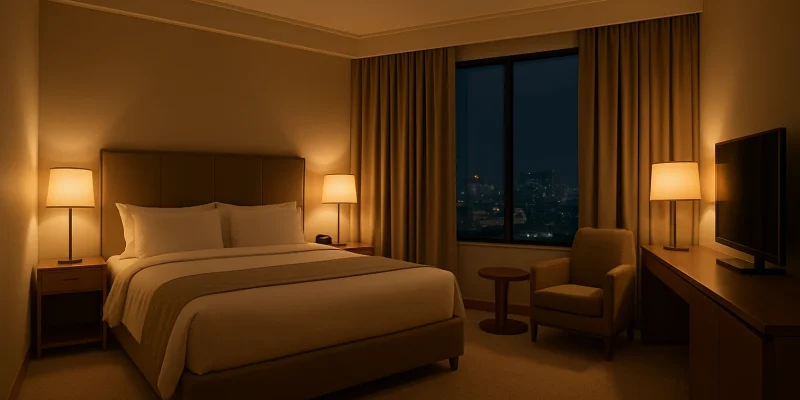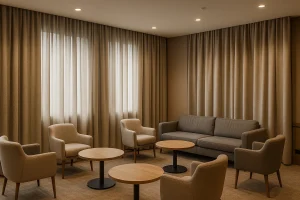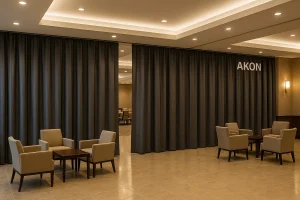
What Soundproof Curtains Are Best for Hotels and Hospitality Spaces?
Noise control plays a major role in creating a comfortable and private atmosphere in hotels and hospitality spaces.
Guests expect quiet rooms that allow them to rest, focus, or socialise without outside noise.
The best soundproof curtains combine acoustic performance with visual appeal, helping hotels maintain both comfort and style.
Modern hospitality design focuses on more than appearance. It values materials that reduce sound, regulate light, and support energy efficiency.
As a result, well-chosen soundproof curtains can improve guest satisfaction and overall room quality.
Best Soundproof Curtains for Hotels and Hospitality Spaces
1. Direct Fabrics Sound-Proof Curtain Panels

Direct Fabrics soundproof curtain panels use dense materials that absorb and block sound in hotel rooms, meeting areas, and lounges.
They help reduce outside noise and make spaces quieter without changing the décor style. Each panel is custom-made to fit specific room sizes and layouts.
These curtains can serve as both window coverings and acoustic room dividers. They have been tested to cut noise by several decibels, which helps create a calmer atmosphere for guests.
Their layered design also supports thermal insulation, improving comfort and energy efficiency.
Many hospitality designers consider them among the best soundproof curtains from the UK as they combine function with a tailored look.
They come in a wide range of fabrics and colours that suit modern or classic interiors.
As a result, hotels can maintain a stylish appearance while reducing unwanted sound effectively.
2. Indow Acoustic Grade Window Inserts
Indow Acoustic Grade window inserts add an extra layer between the main window and the room.
This extra barrier reduces sound vibrations that pass through the glass. The deeper the frame, the larger the air pocket, which helps improve noise reduction.
These inserts can lower outside noise by about 10 to 12 decibels, which equals roughly half the original sound level.
They fit inside existing frames, so no major construction is needed. This makes them practical for hotels that need to maintain quiet rooms without replacing entire windows.
In addition to sound control, the inserts can improve insulation. They help reduce heat transfer and prevent condensation, which supports better comfort for guests.
Hotels near busy streets or airports often use them to create a calmer environment.
Their clear design keeps natural light and the original look of the window. Therefore, they suit hospitality spaces that value both comfort and style.
3. Mass Loaded Vinyl (MLV) Barrier Curtains
Loaded Vinyl (MLV) barrier curtains use a dense vinyl sheet that helps block airborne sound.
The material has a high mass-to-thickness ratio, which makes it effective at reducing noise transfer between rooms.
Hotels often use it to create quieter guest areas near busy streets or service corridors.
These curtains usually include layers that combine MLV with quilted fabric or fibreglass.
The outer layer helps absorb sound reflections, while the vinyl core blocks noise. This layered design helps reduce both echo and noise transmission.
MLV curtains also provide flexibility in installation. They can hang on tracks, wrap around machinery, or line walls and ceilings.
As a result, hotels can use them in guest rooms, meeting areas, or maintenance spaces that need extra sound control.
Although MLV adds weight, it remains thin enough to fit behind decorative fabrics. This allows hotels to keep a comfortable look without losing acoustic performance.
4. AKON Commercial Sound Deadening Curtains

AKON commercial sound-deadening curtains use dense acoustic materials that absorb and block unwanted noise.
They help create a calmer atmosphere in hotels, restaurants, and event spaces where guests expect quiet and comfort. Each curtain can be custom-made to match the layout and design of the space.
These curtains use layered fabrics and sound barriers to reduce echo and limit sound transfer between rooms.
As a result, they support clearer communication and a more private setting for guests or staff.
The design also helps maintain a professional appearance without adding bulky panels or permanent structures.
Some models include clear vinyl panels that allow natural light while still reducing noise.
This feature suits areas such as hotel lobbies or conference spaces that need both visibility and acoustic control.
The curtains can also help regulate temperature, which may lower energy costs and improve overall comfort in hospitality environments.
5. Residential Acoustics® Soundproof Curtains
Residential Acoustics® soundproof curtains use tested materials that help reduce outside noise in hotels and hospitality spaces.
They include multiple dense layers that absorb sound waves and limit noise transfer through windows or thin walls.
This design helps create quieter rooms for guests without major structural changes.
These curtains also serve a decorative purpose. They come in various colours and styles, allowing hotel designers to match them with existing interiors. Therefore, they meet both acoustic and aesthetic needs.
Installation is straightforward, as the curtains hang like standard drapes. However, their thickness and weight give them a more solid appearance and performance. As a result, they can make guest rooms feel more private and restful.
Field and lab testing confirm their sound reduction ability, which supports their use in busy city hotels or near airports.
They provide a practical way to control noise and improve guest comfort across different hospitality settings.
Conclusion
Soundproof curtains help hotels create quiet, comfortable spaces for guests. They reduce outside noise from traffic, hallways, or nearby rooms, which supports better rest and privacy.
Thicker fabrics such as multi-layer polyester, velvet, or vinyl-backed materials tend to block more sound.
However, lighter curtains can still work well in shared areas like lobbies or restaurants where some background noise is acceptable.
Hotels should match the curtain type to each space. For example, blackout soundproof curtains suit bedrooms, while sheer acoustic curtains suit open or social areas.
Selecting curtains that balance noise control, design, and safety standards allows hotels to maintain both comfort and style.





